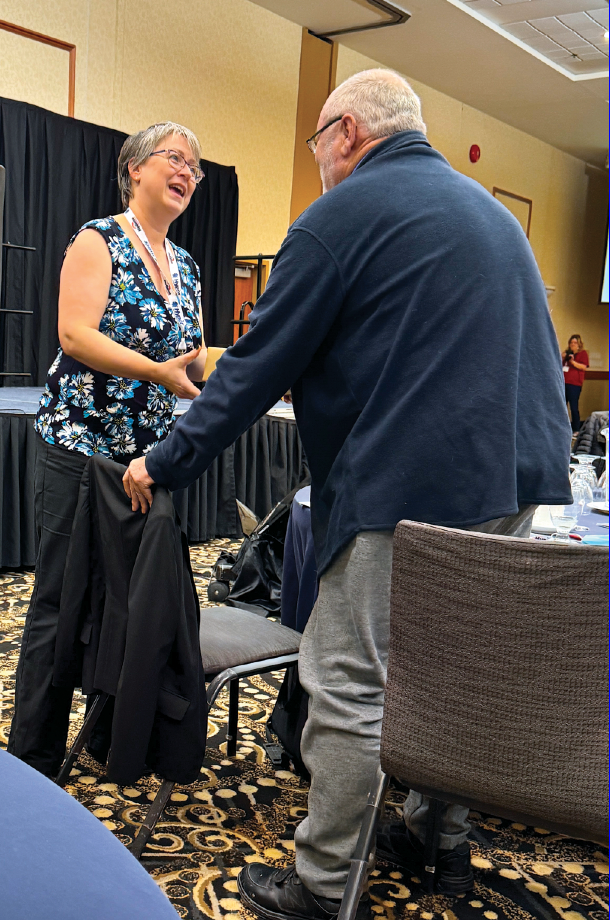
dedication and service, marking a legacy that has profoundly impacted the sector.
Robyn Harte, the swine specialist with Manitoba Agriculture, Manitoba Swine Seminar 2024 committee, and chairing sessions presented Dr. Mike Sheridan with the recognition at the MSS.
Her LinkedIn profile says she has a diverse work history that includes working on farms, in academia, in private industry and also for the government.
Harte believes strongly in educating rural and urban dwellers about the diversity and intricacies of agriculture and work, to further this aim through lecturing at the University, in the grocery store or lines at Tim Horton’s. Agriculture awareness happens everywhere.
“I also strongly believe that agriculture is a vehicle for social justice and food security for the developing world.”
The Manitoba Swine Industry extends its heartfelt gratitude to Dr. Michael Sheridan for his unwavering dedication and service, marking a legacy that has profoundly impacted the sector. Born in Scarborough, Ontario, Mike’s journey in agriculture began on surrounding dairy farms, where his passion for the industry took root. Mike’s intellect blossomed during high school and university despite initial reluctance towards formal education.
After graduating from the University of Guelph’s Ontario Veterinary College in 1977, Mike commenced his career in Selkirk under the guidance of Dr. Gus Wruck. 1978, he married Judith, and together, they welcomed their children, Tim in 1980 and Kate in 1983. 1980 marked the inception of Mike’s swine specialty practice in Steinbach, which flourished into Sheridan, Heuser Swine Services in 1988 alongside Walter Heuser. Over the years, the practice expanded, nurturing students and welcoming new veterinarians.
Dr. Sheridan’s contributions to the Manitoba Swine Industry extend beyond his veterinary practice. He was pivotal in establishing and evolving the Swine Seminars, a cornerstone event for industry professionals. Since its inception in 1986, Dr. Sheridan has been a dedicated participant, embodying knowledge, curiosity, and commitment.
Sheldon Waldner, a beneficiary of Dr. Sheridan’s expertise, recalls his early interactions with the esteemed veterinarian. “When I was new in the barn, Dr. Mike did export inspections about once a month at our barn. He took the time to teach young guys and answer any questions we would have had. His sense of humour even made that job enjoyable.”
Ron Hofer fondly reminisces about Dr. Mike’s visits to their barn in the 80s, describing him as a “Legend” in the industry.
John Sawatzky reflects on Dr. Sheridan’s impact on his career, recalling their collaboration in the late 80s. “Dr. Mike was my vet in 1989 when it was my job to populate a new 600-sow herd north of Winnipeg for a large Japanese company. Mike was always amazed at what we pulled off.”
Shawn Peterson echoes sentiments of admiration and respect, emphasizing Dr. Sheridan’s role as a mentor and beacon in the industry.
Chris Tokaruk of Lethbridge, a genetics butcher, fondly remembers spending time with Dr. Mike, highlighting his knowledge, kindness, and humour.
As the Manitoba Swine Seminars of 2024 pays tribute to Dr. Michael Sheridan, it is evident that his contributions have left an indelible mark on the industry, inspiring generations of professionals and fostering a legacy of excellence and compassion.
In 2020, as reported on Steinbach.ca and Corey Friesen, A new Steinbach-based education and training facility opened. Also inspired by Dr. Sheridan, it offers swine farm workers a hands-on opportunity to learn the veterinary procedures that will help them in their jobs.
Swine Health Professionals (SHP) has officially opened its new Sheridan Room Education and Training Facility.
Dr. Blaine Tully, a Veterinarian and partner with SHP, explained that the new facility will allow the practice to expand on the tradition of education and training inspired by Dr. Mike Sheridan.
He added, “The facility is a purpose built facility for training and education and we’ve involved the culture of biosecurity into the training facility to allow farm workers to come in a safe and biosecure manner that isn’t going to put our practice or their farms at risk by attending any of our workshops.” •
— By Harry Siemens





